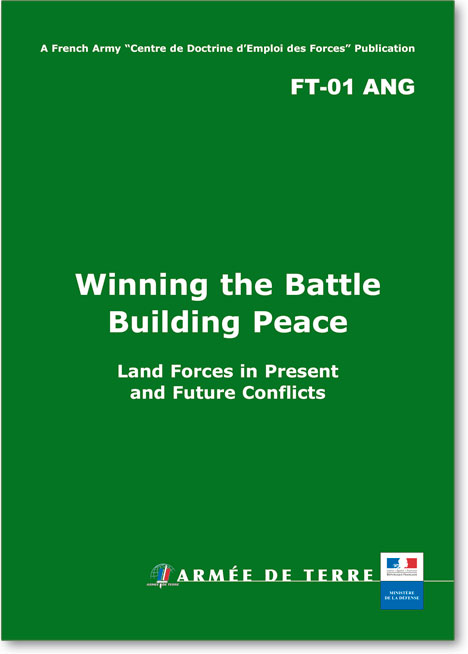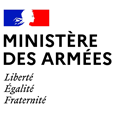October 2007. As an armed confrontation of wills, war always causes destruction and suffering, but its face and place in the world have changed.
At the very heart of these operations, they reach their full potential in the resolution of crises that have strayed from inter state conflict to invest the field of confrontation in the very midst of society.
In this new environment, the French Army asserts and implements a double requirement: that of power and the control of force.
Read the full document: FT-01 ANG - Winning the Battle, Building Peace

FT-01 Winning the Battle, Building Peace, is devoted to the challenges facing land forces in present and future conflicts.
The French Army is publishing a new series of doctrine documents aiming to overarch the whole Army doctrine. These documents are identified under the designation FT-XX (FT as Forces Terrestres).
Below is an executive summary of this booklet. The whole publication is now available in English.
Land Forces in Present and Future Conflicts
As an armed confrontation of wills, war always causes destruction and suffering, but its face and place in the world have changed.
Primarily, it is the political effectiveness of military confrontation that has changed; the destruction of the opponent often no longer constitutes an effective response to conflict situations. Battle, that until recently could lead directly to political success, is no longer sufficient, nor is it the proof of victory or of defeat for the protagonists. Its place has been reduced to that of an initial stage, short and violent, in the general course of conflicts whose durations are extending and for which the establishment of the conditions for a return to peace is becoming decisive. Hence after battle, it becomes necessary to build peace.
But war has also changed because of the emergence of new types of belligerents who, divorced from traditional military logic, live and operate among the people that have become both key actors and stakes in the conflict. Henceforth at the centre of conflict, they are a cause for major concern for military forces.
Faced with these developments, military reaction has changed. No longer is destructive capability the main parameter for an instrument that does not lead directly to the achievement of the strategic objective, but merely contributes to it. It does this with a broad set of actors who all play a role in success or failure and with whom forces need to operate and coordinate.
The cohesion and aim of operations have been modified as a result. The initial intervention stage, where a force generally acts with all means at its disposal, now prepares the way for a stabilisation phase. This phase, both decisive and fundamental to the operation, takes place essentially in the land environment.
The aim of this publication, the fruit of collective thought in the French Army, is to present the main changes that have profoundly affected land forces deployed in a number of theatres. At the very heart of these operations, they reach their full potential in the resolution of crises that have strayed from inter state conflict to invest the field of confrontation in the very midst of society.
In this new environment, the French Army asserts and implements a double requirement: that of power and the control of force.
Winning the Battle and Building Peace
Strategic change is the basis for organic and operational thinking in the French Army.
Military action is evolving and no longer suffices, on its own, to “win wars” whose forms have changed; it leads to the establishment of the minimum conditions for strategic success that develop in the stabilisation phase, the new decisive phase in conflict.
Operating in a joint environment, land forces are, more than ever, at the very heart of operational deployments, where the human factor predominates and where action on the ground and the capacity for discrimination in the use of force are vital for success. In operations taking place in the midst of populations, they currently face new opponents for whom asymmetrical violence, far removed from traditional military logic, is the norm. Endowed with power and an enduring ability to manage effects and versatility, land forces operate in close coordination with non-military actors in order to stabilise the environment and to contribute to the return of stable political and social systems in countries in crisis, which, most often now constitutes the desired strategic objective.
For a number of years, the French Army has been on a path of change that will allow it to fulfil its missions in a number of conflicts where violence and confrontation at the heart of society have taken the place of inter-state conflict.
The French Army has been adapting its structures, doctrine, training and equipment to current operations resolutely and continuously while pursuing the ongoing reflection on the change in terms of military efficiency, the new conditions for the use of force and the necessary developments of the military instrument, and basing its modernity on an understanding of the environment.
Within the French armed forces, and within an increasingly close partnership with our allies, the French Army is pursuing “the preparation of its forces for the reality of their operational commitments”.
Table of contents
The New Face of War
- New World - New Conflicts
- A New Use of Force
- A New Role for the Soldier
Conducting the Operation and Achieving Peace
- Acting
- Controlling
- Adapting
- Mentoring








